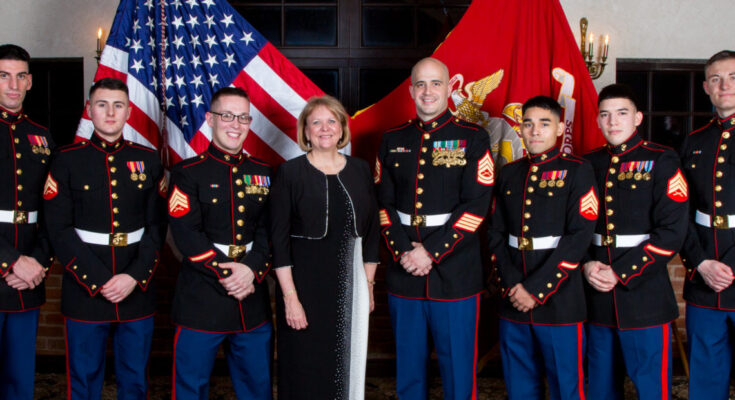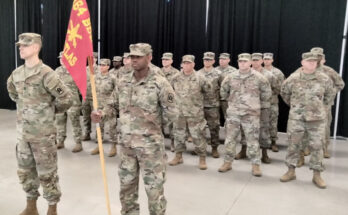The United States Marine Corps (USMC) stands as a symbol of pride, discipline, and honor in the military world. Its roots trace back to the American Revolutionary War, and over the centuries, it has carved out a unique identity, guarding America’s sovereignty and ensuring global peace.
The path to becoming a Marine is rigorous, demanding dedication and resilience. Through its multiple recruitment programs, the USMC identifies and trains individuals who exhibit the values and standards that align with its mission.
In this article, we will delve deep into these recruitment programs, shedding light on what it takes to earn the title of a Marine.
Historical Context of USMC Recruitment
Understanding the recruitment programs necessitates a brief look at the historical context. The USMC was established in 1775, and its primary mission was to provide security onboard naval vessels and assist in ship-to-ship battles. As its role expanded over the decades, the recruitment processes evolved to select individuals with diverse skills suited for varied missions.
Entry-Level Enlistment Programs
The journey for many aspiring Marines begins with entry-level enlistment programs. These are primarily aimed at individuals without prior military experience.
- Delayed Entry Program (DEP): This program allows high school seniors and graduates to commit to the Marines while postponing their active-duty enlistment for up to a year. It provides an opportunity to prepare mentally and physically before embarking on the demanding training ahead.
- Enlisted Commissioning Program (ECP): For those serving in enlisted ranks who wish to transition to officer roles, the ECP offers a pathway. It enables enlisted Marines to earn a college degree and then attend the Officer Candidate School.
Officer Programs for College Students and Graduates
College students and graduates have multiple avenues to enter the USMC as officers. These programs are designed to identify and nurture leadership potential.
- Officer Candidate School (OCS): A rigorous 10-week program, OCS focuses on evaluating an individual’s potential to lead Marines. Candidates undergo challenging physical and mental tasks, ultimately commissioning as second lieutenants upon graduation.
- Naval Reserve Officer Training Corps (NROTC): Partnering with colleges across the nation, the NROTC program offers scholarships to students who commit to serving as Marine officers after graduation. During their college tenure, they receive military training to prepare for their future roles.
Reserve Programs
For those who wish to serve their nation while also pursuing civilian careers, the Marine Corps Reserve offers an ideal blend.
- Selected Marine Corps Reserve (SMCR): This program allows individuals to train close to home, typically one weekend a month and two weeks every summer. It ensures that reservists are ready to be mobilized if the need arises.
Specialized Recruitment Programs
To ensure that the USMC has a diversified skill set, several specialized recruitment programs target specific expertise areas.
- Musician Enlistment Option Program (MEOP): This seeks talented musicians to be part of the renowned Marine Corps bands. Candidates must pass auditions and demonstrate musical prowess.
- Marine Corps Security Force (MCSF) Program: For those interested in high-level security roles, the MCSF program offers training in advanced combat skills, ensuring the protection of naval assets.
Who Can Apply?
If you’re contemplating a life of service and challenge in the Marine Corps, it’s essential to know the eligibility criteria. The Marine Corps sets specific standards to ensure they enlist the best candidates who can uphold the traditions and demands of the Corps. Here’s a breakdown of the qualifications:
- Age Limits: The age range for enlisting in the Marine Corps is typically between 17 and 28 years. However, if you’re 17, you’ll need parental or guardian consent. There are exceptions for reservists and those with specialized skills or prior service experience, which might extend the age limit.
- Educational Qualifications: A high school diploma is usually required, although in some cases, a GED might be accepted. The Marine Corps places a strong emphasis on education, ensuring recruits have the foundational knowledge necessary for training and service.
- Citizenship Requirements: To join the Marine Corps, you must be a U.S. citizen or a legal permanent resident, also known as a Green Card holder. In some cases, non-citizens with crucial skills might be given special consideration.
It’s worth noting that while these are basic criteria, the Marine Corps also assesses physical fitness, moral character, and other attributes during the recruitment process. Always consult with a recruiter for the most up-to-date requirements and to understand if there are waivers or exceptions applicable to your situation.
Remember, the Marine Corps isn’t just looking for anyone – they’re searching for the few, the proud, the Marines. If you believe you fit these qualifications and have the determination to serve, the Corps may be the path for you.
The Recruitment Process of the United States Marine Corps
Joining the elite ranks of the United States Marine Corps is not a task for the faint of heart. It requires determination, grit, and a willingness to serve one’s country. If you’re considering this honorable journey, understanding the recruitment process is essential. Below is a simplified yet comprehensive guide to help you navigate through it.
Initial Contact and Meeting a Recruiter:
- First Impressions Count: Begin your journey by establishing contact with a Marine Corps recruiter. This can be through a local recruitment office, a school event, or even online.
- Face-to-Face Meeting: Once initial contact is made, a face-to-face meeting is arranged. Here, the recruiter provides insights about the Marine Corps life and answers any preliminary questions.
The Armed Services Vocational Aptitude Battery (ASVAB) Test:
- A Measure of Skills: The ASVAB is a multiple-choice test that gauges your knowledge in various subjects and determines your qualifications for specific Marine Corps jobs.
- Preparation is Key: While the test isn’t overly challenging, prospective Marines are advised to review and prepare. Scores play a critical role in job placements.
Physical Examinations and Fitness Tests:
- Ensuring Physical Readiness: Joining the Marines requires physical fitness. Recruits undergo a detailed medical examination to ensure they’re fit for duty.
- Show Your Stamina: In addition to the medical check-up, there’s a physical fitness test. This assesses stamina, strength, and agility—key components of a Marine’s daily life.
The Final Interview and Decision-making Process:
- A Comprehensive Review: The final interview encompasses everything from personal background checks to your reasons for joining. This is also the stage where moral and ethical standards are assessed.
- Awaiting the Decision: Once the interview concludes, the recruitment team deliberates. Successful candidates are then presented with an offer to join the esteemed United States Marine Corps.
However, while the recruitment process may seem daunting, it’s meticulously designed to ensure that only the best join the Marine Corps. So, if you’ve got the passion and drive, take that bold step forward and embrace the challenge.
Benefits of Joining the United States Marine Corps
Joining the United States Marine Corps offers numerous advantages, not only to your professional growth but also to your personal development. Here are some key benefits to consider:
Career Opportunities and Advancements:
- The Marine Corps provides a diverse range of career paths, from aviation to logistics, that cater to various interests and skills.
- Marines are regularly provided with training and mentorship to further their careers, ensuring you are always progressing and achieving your professional goals.
- Leadership roles and responsibilities come naturally as you advance, providing a solid foundation for post-military career opportunities.
Educational Benefits and Training:
- Marines have access to the G.I. Bill, which can cover the costs of college tuition, housing, and even some fees for books.
- There are also numerous other scholarship opportunities exclusive to service members.
- The Marine Corps emphasizes lifelong learning, offering on-the-job training and formal education courses that are transferrable to civilian professions.
Health and Insurance Coverage:
- Comprehensive medical and dental coverage ensures that Marines and their families are well taken care of.
- The military also offers affordable life insurance plans, ensuring the security of loved ones in unforeseen circumstances.
Travel and Overseas Postings:
- Serving in the Marine Corps offers a unique opportunity to see the world. From tropical islands to historic cities, Marines often find themselves stationed in or traveling to intriguing destinations.
- These postings can be enriching experiences, allowing you to immerse in diverse cultures and form global connections.
The Pride of Serving One’s Country:
- There’s an unparalleled sense of pride and accomplishment in serving one’s nation, knowing that you are a part of a legacy that protects and represents American values.
- The camaraderie and brotherhood shared among Marines is a bond that lasts a lifetime.
However, joining the United States Marine Corps offers a wide range of tangible and intangible benefits. Whether you’re driven by professional growth, personal development, or the sheer pride of service, the Marines provide a platform to achieve your aspirations.
How to Prepare for the United States Marine Corps Recruitment Process
Joining the United States Marine Corps (USMC) is an honorable endeavor, but the recruitment process can be challenging. With proper preparation, however, you can improve your chances of success. Here’s a brief guide on how to prepare:
Tips and Resources for Physical Fitness:
- Routine Workouts: Begin with a regular workout routine that includes both cardiovascular exercises like running or swimming and strength training.
- USMC Fitness Standards: Familiarize yourself with the USMC Physical Fitness Test (PFT) and Combat Fitness Test (CFT) standards. Tailor your workouts to meet and exceed these requirements.
- Flexibility Training: Incorporate flexibility exercises into your routine to reduce injury risk and improve overall physical performance.
- Nutrition: Eat a balanced diet. This ensures that your body has the necessary fuel for intense workouts and recovery.
- Rest and Recovery: Give your muscles time to heal by ensuring you get adequate rest after workouts. This can reduce the risk of injuries and improve overall stamina.
Preparing for the ASVAB Test:
- Understand the Format: The Armed Services Vocational Aptitude Battery (ASVAB) consists of multiple subtests that cover topics like mathematics, word knowledge, and mechanical comprehension.
- Study Guides: Invest in ASVAB study guides available in bookstores or online. They often come with practice tests.
- Online Resources: Utilize online platforms and apps that offer ASVAB prep courses or practice questions.
- Study Groups: Consider forming or joining a study group. Collaborative learning can provide different perspectives and approaches to tackling challenging questions.
Interview Preparation and What to Expect:
- Research: Understand the USMC’s values, mission, and history. Showing that you’re well-informed will leave a positive impression.
- Practice Common Questions: Familiarize yourself with typical interview questions for the USMC and practice your answers.
- Dress Appropriately: Wear a professional outfit to show that you take the opportunity seriously.
- Ask Questions: The interview is also your chance to learn more about the USMC. Prepare some thoughtful questions to ask your interviewer.
- Stay Calm and Be Genuine: Remember, the interviewer wants to get to know the real you. Be honest and transparent in your responses.
By dedicating time to physical fitness, ASVAB test preparation, and interview readiness, you can confidently navigate the USMC recruitment process.
Conclusion
In the grand tapestry of our nation’s defense and pride, the United States Marine Corps stands out as a beacon of valor, discipline, and commitment. The importance of its recruitment cannot be overstated, as each new recruit plays a pivotal role in upholding the legacy and strength of the Corps.
To those considering this honorable path: the journey of a thousand miles begins with a single step. Don’t let hesitation hold you back. The Marine Corps offers not just a career, but a call to be a part of something larger than oneself.
Take that first step, apply, and join the ranks of those who defend and represent our great nation with unmatched fervor and dedication. The future of the USMC, and by extension, our nation, is in your hands. Dive in and be a part of this storied legacy.



